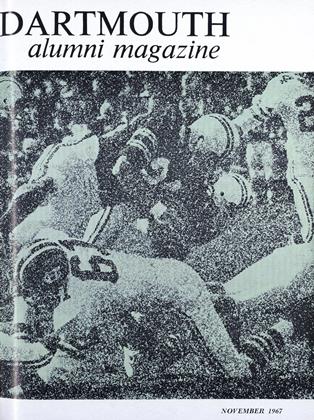By Brock Brower '53. New York:Atheneum, 1967. 228 pp. $4.95.
In his first novel Brock Brower has written a haunting book. Debris is a story of imminent violence, of a wild marsh in the duck country of the Carolina coast, of bitterly maimed and unhappy people who contaminate their small world. The reader who gives himself over to the author will find himself caught by the expectation of what is to come and the implications of all that has built up to an inexorable crisis. Subliminally he will be affected by symbolism which gives extra dimension to the story, by Brower's clean, charged style and his underlying compassion for his characters who are all victims of hate, humiliations, and impotence.
Dexter, a New York advertising executive, has returned to this land he knew as a child, and remembers poignantly Dowd, the hired man who taught him to hunt, "to fly with the bird." The land is now the site of a third-rate hunting lodge and motel "eight dollars with luck, five without" run by Robert Atkins, a guide. Atkins, an expert with cleaver or pastry tube, veteran of almost twenty years as an Army cook, is a man scarringly humiliated by the sexual largesse of his slut of a wife. With his son Paul he has moved in on Ray and Rose Harris, who had bought the strip of coast from Dexter's mother. Atkins took over the motel and Rose Harris and eased her husband into the Army. There, brooding over his wrongs and constantly on report, Harris eventually shot an officer in a successful escape from the Army stockade. Armed, badly wounded, and desperate, Harris is hiding in the duck blind to which Dexter is taken and holds Dexter under his gun while he waits to kill the man who had so savagely wronged him.
Dexter, the civilized man, makes a futile effort to warn Atkins but in the end is a decoy to bring him to his death. The suspense of the final chapter is sustained to the last sentence and the book is much more than its plot, meticulously constructed though that is. The brooding marsh, the flying birds, the "dark, tidal wheeling of the sea," the clean sky, all point up the ugliness of these men and women who have drifted together like flotsam, to be jettisoned by violence and hate.
Mr. Brower, a former editor of The Dartmouth, published his first play, The TenderEdge, shortly after his return from Oxford where he had been a Rhodes Scholar in Merton College. He has written for the Canadian Broadcasting Company and the Car- olina Players, for Life and Esquire. Since leaving Dartmouth his editorial experiences have been with the University of North Carolina Press, Esquire and the TransatlanticReview. Currently a free-lance writer, he lives with his wife, the former Ann Montgomery, and their four children in Princeton, N. J.
Mrs. McCallum, a columnist for the Hanover Gazette, is married to James Dow McCallum, Winkley Professor of the AngloSaxon and English Language and Literature,Emeritus.
 View Full Issue
View Full Issue
More From This Issue
-
 Feature
FeatureA Fulbright Professor in France
November 1967 By FRANCIS E. MERRILL '26, -
 Feature
FeatureMt. McKinley Conquered
November 1967 By Anthony H. Horan '61 -
 Feature
FeatureFINAL REPORT 1966-1967
November 1967 By RALPH LAZARUS '35 -
 Feature
FeatureTHE BETRAYAL OF IDEALISM
November 1967 -
 Feature
FeatureThe Topic: Third Century Fund
November 1967 -
 Article
ArticleWith tine Big Green Teams
November 1967
MARGARET BECK McCALLUM
-
 Books
BooksTHAT GIRL OF PIERRE'S,
December 1948 By MARGARET BECK MCCALLUM -
 Article
ArticleIt's a Small Town . . . With a Large Legacy
JANUARY 1964 By MARGARET BECK MCCALLUM -
 Feature
FeatureDartmouth's First Lady
NOVEMBER 1965 By MARGARET BECK McCALLUM -
 Books
BooksSHIFTS OF BEING.
JULY 1968 By MARGARET BECK MCCALLUM -
 Article
ArticlePeriod Furnishings Sought for Dan'l Webster Cottage
November 1968 By MARGARET BECK MCCALLUM -
 Feature
FeatureWarner's 41 Dramatic Years
MAY 1969 By MARGARET BECK McCALLUM
Books
-
 Books
BooksAlumni Publications
March 1934 -
 Books
BooksCHRISTIAN FAITH IN BLACK AND WHITE: A PRIMER IN THEOLOGY FROM THE BLACK PERSPECTIVE.
May 1974 By FRED BERTHOLD JR. '45 -
 Books
BooksDartmouth Lyrics
June 1924 By H. G. R. -
 Books
BooksIntrepid History
DECEMBER 1982 By J. Craig Kuhn '42 -
 Books
BooksAMERICAN LABOR TODAY (Reference Shelf, Vol. 37, Number 5).
JULY 1966 By ROBERT M. MACDONALD -
 Books
BooksHEARING: PHYSIOLOGY AND SPYCHOPHYSICS.
JANUARY 1972 By WAYNE C. PATTERSON

